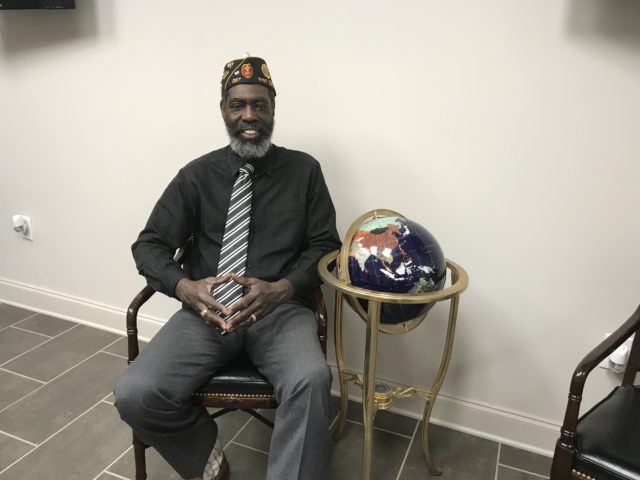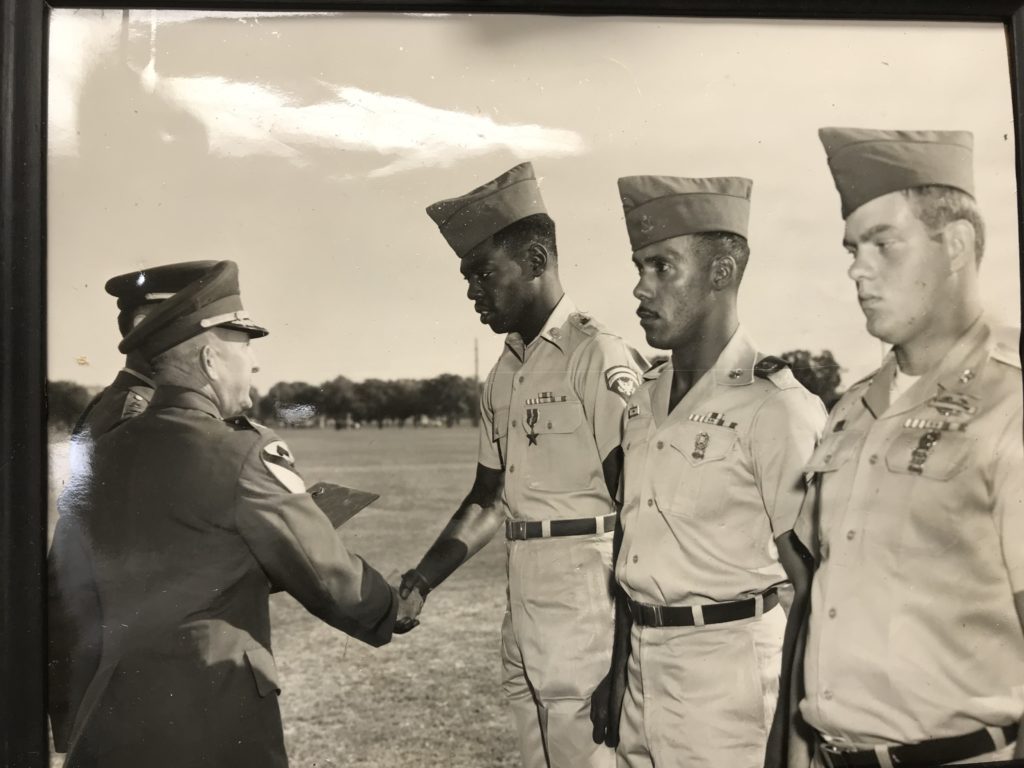
By Erica Wright
The Birmingham Times
Welcome to Third Thursdays! This series—published in the Birmingham Times on the third Thursday of every month—highlights area citizens who overcome odds to make a difference in their own lives or those who make a difference in the lives of others.
As the oldest in a family of eight children, Tyrone T. Tolbert learned early on leadership skills that came in handy during the turbulent 1960s in Birmingham and when he served in the Vietnam War.
Tolbert, 72, a decorated military veteran and successful business owner, was always involved in churches growing up in Birmingham, which made him a valuable participant in the Civil Rights Movement and an eyewitness to history. He remembered when community leaders would meet at different churches to help others pass the literacy test to register to vote.
“In order to help [people] pass, we had a volunteer group that worked with Miles College. We would help them pass the literacy test, and they would pay the poll tax. I was very active in that [program],” Tolbert said. “Most of the time, the Civil Rights community leaders would meet at different churches. Of course, there were some churches that didn’t want to be involved.”
Tolbert’s resume of professional and civic work is as impressive as it is diverse. He has worked for the Atlanta Life Insurance Co., WBRC-TV Fox 6, and WENN radio. He owned an advertising agency served as press secretary for former Birmingham Mayor Richard Arrington. Currently, he operates a demolition and construction company and invests in real estate. In addition, he has served as vice commander and commander of Post 267 for the 21st District of the American Legion Department of Alabama and has served as past chaplain for the 21st district. He’s also an ordained deacon.
Tolbert was recently recognized by the Hoover City Council in celebration of Black History Month and the contributions black military veterans have made to our country—particularly those who served in the Vietnam War, a rarely celebrated conflict for which those who served are seldom given credit or accolades for their sacrifices.
Youth Leader
As a student at Carver High School, Tolbert was one of the youth leaders of the Birmingham Campaign of 1963 and part of the Children’s Crusade, when more than 1,000 students skipped classes and gathered at Sixteenth Street Baptist Church to march to downtown Birmingham to protest segregation. He was tasked with getting students to walk out of schools and begin the demonstrations, which was not easy.
“A lot of them were afraid because they were worried that their parents would get in trouble, maybe lose their jobs, but we had to be committed,” Tolbert said. “One of the teachers called me in, closed the door, and said, ‘This conversation never took place. But if y’all stick together, we can make this happen because we can’t teach if there are no students here. If there are only a few of y’all walking out, they can single you out and they’ll rip you apart, so you have to be committed.’ He knew I was committed, [I just had to get] enough followers to be committed.”
On the first day, known famously as “D-Day,” students were to leave their schools at noon and meet downtown for a demonstration.
“The first group was really kind of afraid,” Tolbert said. “Only a few people went out because [teachers and administrators] had called us in that morning and told us, ‘If you’re over 16 and walk off campus, you will not graduate. … If you’re under 16, you will be put back a grade.’ They had a roll-call assembly to make sure everybody knew because [the] order came down from the police commissioner through the school superintendent. It was mandatory that all teachers conducted a roll call to make sure each student was there and had been warned.”
Tolbert, however, was not deterred.
“At noon, I walked out with my little entourage of folks,” he said. “[We] took off walking, came down behind the civic center and over to Sixteenth Street Baptist Church, where we were to meet and get our signs.”
Success
After about the third day, the number of students who began to demonstrate grew, and it became increasingly difficult for the authorities to handle, Tolbert said. There were very few students in school because a lot of parents kept their younger students out of school and the older ones were marching.
“Long story short, the D-Day demonstration was a success,” Tolbert said. “We broke the back of Jim Crow, [laws that enforced racial segregation in the Southern U.S. during the late 19th and early 20th centuries], because these were students and young people protesting to show that our Civil Rights were totally being violated, that we were being treated like nonpersons and wanted equality, freedom, and an opportunity just to be treated like other human beings. I think eventually they heard our cry.”
Tolbert said they didn’t see themselves as Foot Soldiers, the moniker commonly used to describe those who fought the good fight during the 1960s Civil Rights Movement.
“We were just kids who wanted to bring about change,” he said. “I’d ask my mother, ‘Mommy, why didn’t y’all straighten this out before it got to us?’ She said, ‘It wasn’t our time to straighten it out. It’s your time.’ That struck me.”
Foot Soldier
Tolbert grew up in East Birmingham with his mother and father, Thelma and Thomas Tolbert. He was the oldest of eight children.
“After I was big enough to start helping with the family, I helped raise my siblings,” Tolbert said. “We were people who practiced basic, Christian values in our home. My dad was a Methodist and my mother was Baptist, and between the two of them I had a choice whether I wanted to be Baptist or Methodist. I figured since John was a Baptist, I would go with that. I joined [Parker Memorial Baptist Church] at a very young age, at about eight or nine, and I was always very active in church.”
One month after he graduated from Carver in January 1964, he enlisted in the U.S. Army.
Army Man

“I graduated on January 31 and was inducted into the military the next day, February 1,” Tolbert said.
Before being sent to Vietnam in 1967, he was based at a few different military posts, where he gained valuable experience.
“I was stationed in Fort Jackson, S.C, and Fort Gordon, Ga. I eventually re-enlisted through a school in New Jersey to become an electronics technician and learned to put together radio stations and keep them on the air—and these were big radios, not the little portable kind you carry around,” he said. “In Germany, I went to several different service schools trying to advance myself because I found out that in the military, they tell, you don’t volunteer for anything. There are some things you do volunteer for, but I went to service school and became a graduate of the 24th Infantry Division Non-Commission Officers Academy, which later was a very good asset to me because it was very prestigious to have that on your record. By the time I went to Vietnam, I [had achieved the rank of E-6, [staff sergeant].”
Being stationed overseas and coming home can be an adjustment for soldiers, Tolbert said.
“I think … people need to know that when [soldiers] are sent off into harm’s way, … here’s a person you take out of the jungle or off the front lines and put them back into civilian life, where there are cars, horns, ambulances, police sirens, blue lights, and things happening. It’s just kind of mind boggling for them to try to integrate back into that life.” he said.
After returning from Vietnam, Tolbert went to Fort Sill, Okla., where he received the Bronze Star medal for consistently manifesting exemplary professionalism and initiative in obtaining outstanding results during his time in the Vietnam War. He then returned to Birmingham and sold insurance before using his GI Bill—a program that provides educational assistance to military service members, veterans, and their dependents—to enroll in Lawson State Community College (LSCC), where he became president of the Student Government Association (SGA). After graduating from LSCC, he attended the University of Alabama at Birmingham (UAB), where he majored in mass communications with a minor in urban studies. As a UAB student, Tolbert was recruited by the 87th Maneuver Area Command (MAC) in Hoover.
Arrington’s Press Secretary
Tolbert worked for local television station WBRC-TV Fox 6 and then became the first press secretary for former Birmingham Mayor Richard Arrington.
“We pulled together a staff and would meet at Sixth Avenue Baptist Church,” Tolbert said. “They wanted Shelley Stewart, [the former local radio personality and station owner who used his radio program to pass along information about mass meetings and planned marches during the Children’s Crusade of 1963], to be the public relations person because he was well known all over the city, but they couldn’t. They asked [Stewart], ‘Well, why don’t you get Tolbert to do the press? … It just so happened that I knew just about everybody in media at that time.”
Working for Arrington as press secretary was easy because the mayor wrote his own speeches and was politically savvy.
“The only thing I had to do was kind of guide him through the do’s and don’ts of public relations,” Tolbert said. “One of the tough parts was keeping the reporters from riding with him in the car. [I told the mayor], ‘They’ll ride with you and catch you off guard saying something you might regret.’”
Life of Service
Tolbert has been in the demolition business for about 20 years—and he learned the old-fashioned way.
“I wasn’t a first- or second-generation contractor, so I didn’t know anything about contracting, but I figured I could learn,” said Tolbert, who’s also a real estate investor. “I started working around some of the older guys who knew the business, and these guys thought I was an inspector because I would be out there on the job site with my collar and tie on, in a nice car. … I started out with a pickup truck and started cutting lots. … From there, I got other tools.”
Tolbert has been married for 36 years to his wife, Miriam Tolbert, and they have three children: Olivia Michelle, the oldest, lives in Homewood; Tyrone Jr., lives in Naples, Fla.; and Jessica Marie lives in Memphis, Tenn.
As commander Post 267 for the 21st District of the American Legion Department of Alabama, which encompasses all of Jefferson County, the largest district in the state, Tolbert continues to serve his country and community.
“I’m a soldier still serving, and it has been quite great therapy for me because you don’t end up licking your own wounds when you’re helping somebody else,” he said.
Click here to read more Third Thursday stories: Rochelle Malone; Reginald Ruffin; Karneshia Patton; Magnolia Cook; Liz Huntley; Annie Avery; Clover Moore; Erica Robbins.







